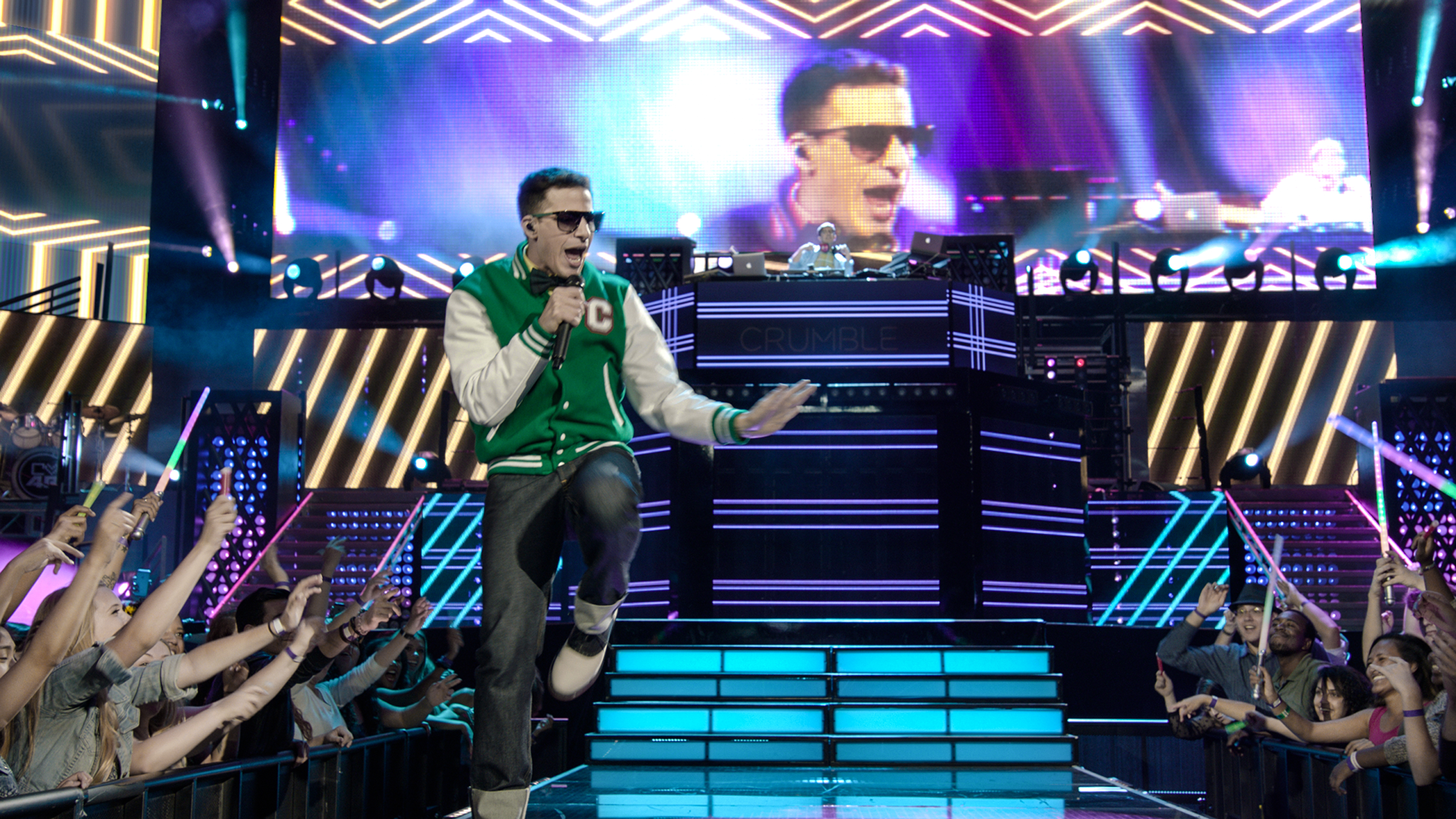Few filmmakers in American comedy make more of spectacular nonsense than the Lonely Island (Akiva Schaffer, Andy Samberg, and Jorma Taccone), and “Popstar: Never Stop Never Stopping” fits comfortably into the group’s decade-long filmmaking excursion towards the delightful and absurd. The pop-mockumentary mixes the glossy and silly into another syllabic ode to bullshit ideas ranging from Macklemore parody to turtle tragedy. What matters in “Popstar” more than transitional gravitas is the endpoint of ludicrous American destiny, demolishing legend into oblivious, cleverly sketched shards.
“Popstar” follows Conner4Real, a successful tween popstar on the eve of his highly anticipated second album’s release. Like Justin Timberlake (who makes one of the film’s many cameo appearances), Conner was once the charismatic centerpiece of a three-piece boy band, The Style Boyz (Samberg, Schaffer, and Taccone). When fame went to Conner’s empty head, he clashed with Lawrence (Schaffer) before flying solo and demoting fellow Style Boyz member Owen (Taccone) to backup DJ status. As Conner’s second album launches, as the tour deteriorates, as gimmicks fail and sycophants abandon him, as all seems lost — will the Style Boyz reunite? Will the tour continue? Will Seal survive a marriage-proposal-wolf-attack?
These questions are almost completely irrelevant. “Popstar” barely troubles itself with narrative beyond the essential, meta-textual trappings of the Style Boyz’s resemblance to the Lonely Island itself. Like Conner, Samberg has achieved the greatest level of onscreen fame; but the comparison falls apart once one notes the level of collaboration at work in the filmmaking. All three members star (Taccone and Schaffer co-direct their own script, which was co-written with Samberg), and while this is certainly a movie about Conner and his unceasingly silly world, “Popstar”‘s occasional pathos aligns nicely with the group’s collaborative spirit.
Desperate for validation and wholly privileged, Conner is the character equivalent of a lazy teen made to brush their teeth three times a day, full of sighs and tantrums and loud outros. Like the centerpiece duo of “This Is Spinal Tap,” Conner’s delusion is inextricably tied to a pop cultural image he barely hopes to contain. He’s constantly self-sharing and scratching to make every horrible lyric or referential baseline fit into the parameters of his ego. When this inevitably fails, everyone else on tour must attempt to save Conner from himself and themselves from unemployment.
“Everyone else” ends up meaning a bevy of talented comic actors. This is a movie more overstuffed with cameos than my cheeks dealing with the crust end of a large PB&J. Will Arnett, Chelsea Peretti, Eric Andre, and Mike Birbligia shine in a TMZ parody cutaway that drifts into anti-comedy with every hoarse laugh and loud clap. Bill Hader and Joanna Newsom appear in an enjoyable Flatliners-riff that ends just as it begins. Maya Rudolph plays a corporate branding synchronizer to uneasy perfection before vanishing from the movie for an hour (only to later reappear). Even Martin Sheen shows up, for reasons I still can’t quite grasp and don’t particularly need to grasp. The abundance of cameos ought to annoy more often than it does, but for the most part, the arrivals sing. The absurdist strain and non-seriousness of the film keeps their reflexivity from turning vomitous, and the gibberish retains an enjoyably positive spirit from minute one to 86.
The movie also looks better than the average studio comedy thanks to Brandon Trost’s hyper-digital cinematography and the kinetic editing of Craig Alpert, Jamie Gross, and Stacey Schroeder. Taccone and Schaffer don’t reinvent the visual wheel, but as with “Hot Rod” and “MacGruber,” they prove to be fine imitators of genre style, capable of punctuating a visual joke with the right camera shift or documentarian zoom.
“Popstar” relies on a sense of constant movement to make its never-ending array of sketches and one-liners work, and the filmmakers mostly achieve the necessary zip thanks to the work of talented actors like Imogen Poots and Tim Meadows. The film only lags when it relies on heavily ironic talking head cutaways as a narrative buoy. The DJ Khaled- Usher-Ringo Starr interviews are fun enough, but wear thin when heavily leaned upon upon again and again as a record scratch of reality versus perception.
While the best material in “Popstar” often emanates from its pop roots – particularly in terms of Macklemorian satire – the film works best when stretched to the total limits of obliviousness and media saturation. Due to his fame, wealth and status, Conner’s world has mostly been constructed from his own mind and bears no relation to a pre-Vine, vlogging world. Within the blanketing layers of nonsense and hedonistic fulfillment lies the sheer confusion of decadence, the final climax of a lofted individual who views the world merely as an extension of the self.
“Popstar: Never Stop Never Stopping” isn’t so much a critique of “poptimism” as it is an warning to pop-icon-dreamers who don’t evolve, and selves who won’t see. This is where the Lonely Island becomes, for perhaps a frame or two of poolside existentialism, more than just a purveyor of the gleeful and absurd. By stretching the branded and self-serious into the juvenile and silly, the group reduces an ideal into its component parts, each of which makes less and less sense when deconstructed. “Popstar: Never Stop Never Stopping” never quite reaches the heights of “Hot Rod,” but that’s hardly a failure. It’s more about the thought than the thing.
I also laughed.
Contact Connor Huchton at [email protected].
